- Home
- Umberto Eco
The Mysterious Flame Of Queen Loana
The Mysterious Flame Of Queen Loana Read online
The Mysterious Flame Of Queen Loana
Umberto Eco
Umberto Eco
The Mysterious Flame Of Queen Loana
English translation copyright © 2005 by Geoffrey Brock
Part One. THE INCIDENT
1. The Cruelest Month
"And what’s your name?"
"Wait, it’s on the tip of my tongue."
That is how it all began.
I felt as if I had awoke from a long sleep, and yet I was still suspended in a milky gray. Or else I was not awake, but dreaming. It was a strange dream, void of images, crowded with sounds. As if I could not see, but could hear voices that were telling me what I should have been seeing. And they were telling me that I could not see anything yet, only a haziness along the canals where the landscape dissolved. Bruges, I said to myself, I was in Bruges. Had I ever been to Bruges the Dead? Where fog hovers between the towers like incense dreaming? A gray city, sad as a tombstone with chrysanthemums, where mist hangs over the façades like tapestries.. .
My soul was wiping the streetcar windows so it could drown in the moving fog of the headlamps. Fog, my uncontaminated sister… A thick, opaque fog, which enveloped the noises and called up shapeless phantoms. .. Finally I came to a vast chasm and could see a colossal figure, wrapped in a shroud, its face the immaculate whiteness of snow. My name is Arthur Gordon Pym.
I was chewing fog. Phantoms were passing, brushing me, melting. Distant bulbs glimmered like will-o’-the-wisps in a graveyard …
Someone is walking by my side, noiselessly, as if in bare feet, walking without heels, without shoes, without sandals. A patch of fog grazes my cheek, a band of drunks is shouting down there, down by the ferry. The ferry? It is not me talking, it is the voices.
The fog comes on little cat feet… There was a fog that seemed to have taken the world away.
Yet every so often it was as if I had opened my eyes and were seeing flashes. I could hear voices: "Strictly speaking, Signora, it isn’t a coma… No, don’t think about flat encephalograms, for heaven’s sake… There’s reactivity…"
Someone was aiming a light into my eyes, but after the light it was dark again. I could feel the puncture of a needle, somewhere. "You see, there’s withdrawal…"
Maigret plunges into a fog so dense that he can’t even see where he’s stepping… The fog teems with human shapes, swarms with an intense, mysterious life. Maigret? Elementary, my dear Watson, there are ten little Indians, and the hound of the Baskervilles vanishes into the fog.
The gray vapor was gradually losing its grayness of tint, the heat of the water was extreme, and its milky hue was more evident than ever … And now we rushed into the embraces of the cataract, where a chasm threw itself open to receive us.
I heard people talking around me, wanted to shout to let them know I was there. There was a continuous drone, as though I were being devoured by celibate machines with whetted teeth. I was in the penal colony. I felt a weight on my head, as if they had slipped the iron mask onto my face. I thought I saw sky blue lights.
"There’s asymmetry of the pupillary diameters."
I had fragments of thoughts, clearly I was waking up, but I could not move. If only I could stay awake. Was I sleeping again? Hours, days, centuries?
The fog was back, the voices in the fog, the voices about the fog. Seltsam, im Nebel zu wandern! What language is that? I seemed to be swimming in the sea, I felt I was near the beach but was unable to reach it. No one saw me, and thdrawing by the authore tide was carrying me away again.
Please tell me something, please touch me. I felt a hand on my forehead. Such relief. Another voice: "Signora, there are cases of patients who suddenly wake up and walk away under their own power."
Someone was disturbing me with an intermittent light, with the hum of a tuning fork. It was as if they had put a jar of mustard under my nose, then a clove of garlic. The earth has the odor of mushrooms.
Other voices, but these from within: long laments of the steam engine, priests shapeless in the fog walking single file toward San Michele in Bosco.
The sky is made of ash. Fog up the river, fog down the river, fog biting the hands of the little match girl. Chance people on the bridges to the Isle of Dogs look into a nether sky of fog, with fog all round them, as if they were up in a balloon and hanging under the brown fog… I had not thought death had undone so many. The odor of train station and soot.
Another light, softer. I seem to hear, through the fog, the sound of bagpipes starting up again on the heath.
Another long sleep, perhaps. Then a clearing, like being in a glass of water and anisette…
He was right in front of me, though I still saw him as a shadow. My head felt muddled, as if I were waking up after having drunk too much. I think I managed to murmur something weakly, as if I were in that moment beginning to talk for the first time: "Posco reposco flagito-do they take the future infinitive? Cujus regio ejus religio… is that the Peace of Augsburg or the Defenestration of Prague?" And then: "Fog too on the Apennine stretch of the Autosole Highway, between Roncobilaccio and Barberino del Mugello…"
He smiled sympathetically. "But now open your eyes all the way and try to look around. Do you know where we are?" Now I could see him better. He was wearing a white-what is it called?-coat. I looked around and was even able to move my head: the room was sober and clean, a few small pieces of pale metal furniture, and I was in bed, with a tube stuck in my arm. From the window, through the lowered blinds, came a blade of sunlight, spring on all sides shines in the air, and in the fields rejoices. I whispered: "We are… in a hospital and you… you’re a doctor. Was I sick?"
"Yes, you were sick. I’ll explain later. But you’ve regained consciousness now. That’s good. I’m Dr. Gratarolo. Forgive me if I ask you some questions. How many fingers am I holding up?"
"That’s a hand and those are fingers. Four of them. Are there four?"
"That’s right. And what’s six times six?"
"Thirty-six, of course." Thoughts were rumbling through my head, but they came as if of their own accord. "The sum of the areas of the squares… built on the two legs… is equal to the area of the square built on the hypotenuse."
"Well done. I think that’s the Pythagorean theorem, but I got a C in math in high school…"
"Pythagoras of Samos. Euclid’s elements. The desperate loneliness of parallel lines that never meet."
"Your memory seems to be in excellent condition. And by the way, what’s your name?"
That is where I hesitated. And yet I did have it on the tip of my tongue. After a moment I offered the most obvious reply.
"My name is Arthur Gordon Pym."
"That isn’t your name."
Of course, Pym was someone else. He did not come back again. I tried to come to terms with the doctor.
"Call me… Ishmael?"
"Your name is not Ishmael. Try harder."
A word. Like running into a wall. Saying Euclid or Ishmael was easy, like saying Jack and Jill went up a hill. Saying who I was, on the other hand, was like turning around and finding that wall. No, not a wall; I tried to explain. "It doesn’t feel like something solid, it’s like walking through fog."
"What’s the fog like?" he asked.
"The fog on the bristling hills climbs drizzling up the sky, and down below the mistral howls and whitens the sea… What’s the fog like?"
"You put me at a disadvantage-I’m only a doctor. And besides, this is April, I can’t show you any fog. Today’s the twenty-fifth of April."
"April is the cruelest month."
"I’m not very well read, but I think that’s a quotation. You could say that today’s the Day of Libera
tion. Do you know what year this is?"
"It’s definitely after the discovery of America…"
"You don’t remember a date, any kind of date, before… your reawakening?"
"Any date? Nineteen hundred and forty-five, end of World War Two."
"Not close enough. No, today is the twenty-fifth of April, 1991. You were born, I believe, at the end of 1931, all of which means you’re pushing sixty."
"Fifty-nine and a half. Not even."
"Your calculative faculties are in excellent shape. But you have had, how shall I say, an incident. You’ve come through it alive, and I congratulate you on that. But clearly something is still wrong. A slight case of retrograde amnesia. Not to worry, they sometimes don’t last long. But please be so kind as to answer a few more questions. Are you married?"
"You tell me."
"Yes, you’re married, to an extremely likable lady named Paola, who has been by your side night and day. Just yesterday evening I insisted she go home, otherwise she would have collapsed. Now that you’re awake, I’ll call her. But I’ll have to prepare her, and before that we need to do a few more tests."
"What if I mistake her for a hat?"
"Excuse me?"
"There was a man who mistook his wife for a hat."
"Oh, the Sacks book. A classic case. I see you’re up on your reading. But you don’t have his problem, otherwise you’d have already mistaken me for a stove. Don’t worry, you may not recognize her, but you won’t mistake her for a hat. But back to you. Now then, your name is Giambattista Bodoni. Does that tell you anything?"
Now my memory was soaring like a glider among mountains and valleys, toward a limitless horizon. "Giambattista Bodoni was a famous typographer. But I’m sure that’s not me. I could as easily be Napoleon as Bodoni."
"Why did you say Napoleon?"
"Because Bodoni was from the Napoleonic era, more or less. Napoleon Bonaparte, born in Corsica, first consul, marries Josephine, becomes emperor, conquers half of Europe, loses at Waterloo, dies on St. Helena, May 5, 1821, he was as if unmoving."
"I’ll have to bring my encyclopedia next time, but from what I remember, your memory is good. Except you don’t remember who you are."
"Is that serious?"
"To be honest, it’s not so good. But you aren’t the first person something like this has happened to, and we’ll get through it."
He asked me to raise my right hand, then to touch my nose. I understood perfectly what my right hand was, and my nose. Bull’s-eye. But the sensation was absolutely new. Touching your nose is like having an eye on the tip of your index finger, looking you in the face. I have a nose. Gratarolo thumped me on the knee and then here and there on my legs and feet with some kind of little hammer. Doctors measure reflexes. It seemed that my reflexes were good. By the end I felt exhausted, and I think I went back to sleep.
I woke up in a place and murmured that it resembled the cabin of a spaceship, like in movies. (What movies, Gratarolo asked; all of them, I said, in general; then I named Star Trek.) They did things to me I did not understand, using machines I had never seen. I think they were looking inside my head, but I let them, not thinking, lulled by humming sounds, and now and then I dozed again.
Later (or the next day?), when Gratarolo returned, I was exploring the bed. I was feeling the sheets: light, smooth, pleasing to the touch. Less so the cover, which was a little prickly against my fingertips. I turned over and pounded my hand into the pillow, enjoying the fact that it sank into it. I was going whack whack and having a great time. Gratarolo asked me if I thought I could get out of bed. With the help of a nurse, I managed to stand up, though my head was still spinning. I felt my feet pressing against the ground, and my head was up in the air. That is how you stand up. On a tightrope. Like the Little Mermaid.
"Good. Now try going to the bathroom and brushing your teeth. Your wife’s toothbrush should be in there." I told him one should never brush one’s teeth with a stranger’s toothbrush, and he remarked that a wife is not a stranger. In the bathroom, I saw myself in the mirror. At least I was fairly sure it was me, because mirrors, as everyone knows, reflect what is in front of them. A white, hollow face, a long beard, and two sunken eyes. This is great: I do not know who I am but I find out I am a monster. I would not want to meet me on a deserted road at night. Mr. Hyde. I have identified two objects: one is definitely called toothpaste, the other toothbrush. You have to start with the toothpaste and squeeze the tube. Exquisite sensation, I ought to do it frequently. But at a certain point you have to quit-that white paste at first pops, like a bubble, but then it all comes out like le serpent qui danse. Don’t keep squeezing, otherwise you’ll be like Broglio with the stracchini. Who’s Broglio?
The paste has an excellent flavor. Excellent, said the Duke. That is a Wellerism. These, then, are flavors: things that caress the tongue and also the palate, though it seems to be the tongue that detects the flavors. Mint flavor-y la hierbabuena, a las cinco de la tarde … I made up my mind and did what everyone does in such cases, quickly and without thinking much about it: first I brushed up and down, then from left to right, then around the whole set. It’s interesting to feel bristles going between two teeth, from now on I think I will brush my teeth every day, it feels nice. I also ran the bristles over my tongue. You feel a sort of shudder, but in the end if you don’t press down too hard it’s okay. That was a good idea, because my mouth was quite pasty. Now, I said to myself, you rinse. I ran some water from the tap into a glass and swirled it around in my mouth, happily amazed at the sound it made. And it gets even better if you toss your head back and make it-gurgle? Gurgling is good. I puffed up my cheeks, and then it all came out. I spit it out. Sfroosh … a cataract. You can do anything with lips, they are extremely flexible. I turned around, Gratarolo was standing there watching me like I was a circus freak, and I asked him if it was going well.
Perfectly, he said. My automatisms, he explained, were in good shape.
"It seems we have an almost normal person on our hands," I remarked, "except that he might not be me."
"Very witty, and that’s a good sign too. Now lie back down-here, I’ll help you. Tell me: what did you just do?"
"I brushed my teeth; you asked me to."
"Absolutely, and before you brushed your teeth?"
"I was in this bed and you were talking to me. You said it’s April 1991."
"Right. Your short-term memory is working. Tell me, do you by any chance recall the brand of the toothpaste?"
"No. Should I?"
"Not at all. You certainly saw the brand when you picked up the tube, but if we had to record and store all the stimuli we encounter, our memory would be a bedlam. So we choose, we filter. You did what we all do. But now try to remember the most significant thing that happened while you were brushing your teeth."
"When I ran the brush over my tongue."
"Why?"
"Because my mouth was pasty, and after I did that I felt better."
"You see? You recorded the element most directly associated with your emotions, your desires, your goals. You have emotions again."
"It’s a nice emotion, brushing your tongue. But I don’t recall having ever brushed it before."
"We’ll get there. Now, Signor Bodoni, I’ll try to explain all this in plain language, but it’s clear that the incident has affected certain regions of your brain. And even though a new study comes out every day, we don’t yet know as much as we’d like to know about cerebral localizations, especially as regards the various forms of memory. I’d dare say that if what has happened to you had happened ten years from now, we’d have a better idea how to manage the situation. Don’t interrupt, I understand, if it had happened to you a hundred years ago you’d already be in a madhouse, end of story. We know more today than we did then, but not enough. For example, if you were unable to talk, I could tell you exactly which area had been affected…"
"Broca’s area."
"Bravo. But we’ve known about Broca’
s area for more than a hundred years. Where the brain stores memories, however, is still a matter of debate, and more than one area is certainly involved. I don’t want to bore you with scientific terms, which in any case might add to the confusion you feel-you know how, when the dentist has done something to one of your teeth, for a few days afterward you keep touching it with your tongue? Well, if I were to say, just for instance, that I’m not as concerned about your hippocampus as I am about your frontal lobes, and perhaps the right orbital frontal cortex, you would try to touch yourself there, and it’s not like exploring your mouth with your tongue. Endless frustration. So forget what I just said. And besides, every brain is different from every other, and all brains have extraordinary plasticity, so that over the course of time yours may be able to assign the tasks that the injured area can no longer perform to some other area. Do you follow, am I being clear enough?"
"Crystal clear, keep going. But first are you going to tell me that I’m the Collegno amnesiac?"
"You see? You remember the Collegno amnesiac, which is a classic case. It’s only your own, which isn’t classic, that you don’t remember."
"I’d rather have forgotten about Collegno and remembered where I was born."
"That would be more unusual. You see, you identified the toothpaste tube immediately, but you don’t recall being married-and indeed, remembering your own wedding and identifying the toothpaste tube depend on two different cerebral networks. We have different types of memory. One is called implicit, and it allows us to do with ease various things we’ve learned, like brushing our teeth, turning on the radio, or tying a tie. After the toothbrushing experiment, I’m willing to bet that you know how to write, perhaps even how to drive a car. When our implicit memory is assisting us, we’re not even conscious of remembering, we act automatically. And then there’s something called explicit memory, by which we remember things and know we’re remembering them. But this explicit memory is twofold. One part tends nowadays to be called semantic memory, or public memory-the one that tells us a swallow is a kind of bird, and that birds fly and have feathers, but also that Napoleon died in… whenever you said. And this type seems to be working fine in your case. Indeed, I might even say too well, since all I have to do is give you a single input and you begin stringing together memories that I would describe as scholastic, or else you fall back on stock phrases. But this is the first type to form even in children. The child quickly learns to recognize a car or a dog, and to form general categories, so that if he once saw a German shepherd and was told it was a dog, then he’ll also say ‘dog’ when he sees a Labrador. It takes the child longer, however, to develop the second type of explicit memory, which we call episodic, or autobiographical. He isn’t immediately capable of remembering, when he sees a dog, say, that a month earlier he saw a dog in his grandmother’s yard, and that he’s the person who has had both experiences. It’s episodic memory that establishes a link between who we are today and who we have been, and without it, when we say I, we’re referring only to what we’re feeling now, not to what we felt before, which gets lost, as you say, in the fog. You haven’t lost your semantic memory, you’ve lost your episodic memory, which is to say the episodes of your life. In short, I’d say you know all the things other people know, and I imagine that if I were to ask you to tell me the capital of Japan…"

 Baudolino
Baudolino The Name of the Rose
The Name of the Rose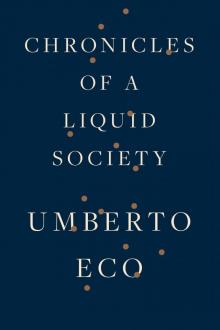 Chronicles of a Liquid Society
Chronicles of a Liquid Society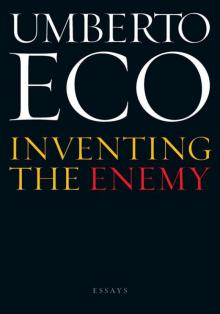 Inventing the Enemy: Essays
Inventing the Enemy: Essays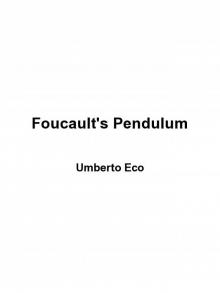 Foucault's Pendulum
Foucault's Pendulum How to Travel With a Salmon & Other Essays
How to Travel With a Salmon & Other Essays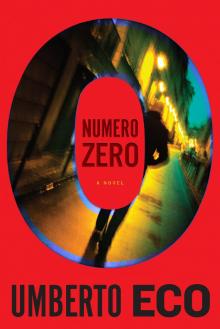 Numero zero
Numero zero The Island of the Day Before
The Island of the Day Before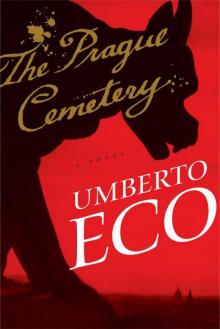 UMBERTO ECO : THE PRAGUE CEMETERY
UMBERTO ECO : THE PRAGUE CEMETERY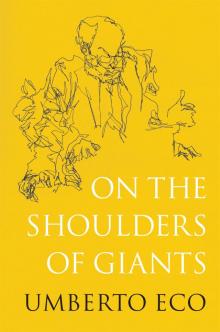 On the Shoulders of Giants
On the Shoulders of Giants Misreadings
Misreadings Six Walks in the Fictional Woods
Six Walks in the Fictional Woods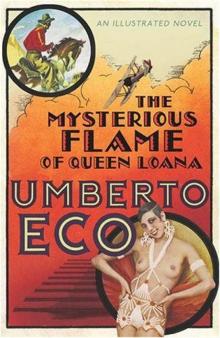 The Mysterious Flame Of Queen Loana
The Mysterious Flame Of Queen Loana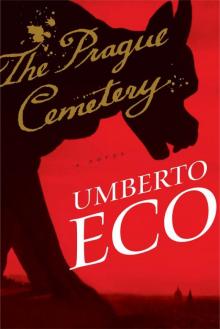 The Prague Cemetery
The Prague Cemetery On Literature
On Literature Lost structure
Lost structure